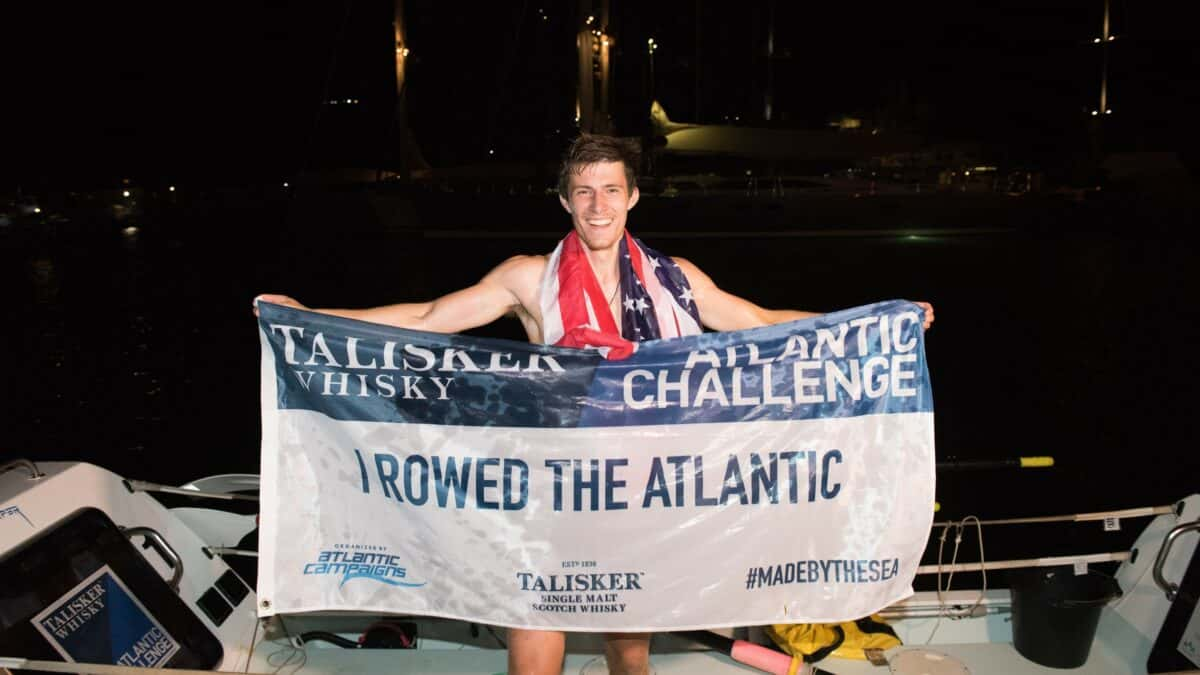
27 Feb 2018
Rowing alone for 44 days
Crane was part of the Talisker Whisky Atlantic Challenge which started in December 2017 and he saw it as the perfect opportunity to test himself during a gap year after graduating from New Jersey’s Peddie School, USA, where he rowed in a coxed four.
Crossing the Atlantic turned out to be a much more hands-on ordeal than Crane expected, but at the end he went into the record books for youngest solo crossing. World Rowing caught up with the American rower following his epic 44-day, 5000-kilometre journey from the Canary Islands to Antigua.
“I wanted to test my physical and mental limits far beyond anything I had ever attempted,” says Crane of his motivations to attempt the crossing. “I also wanted to show my little brother, who’s way more capable than I am, that he can do or achieve anything he sets his mind to.”
While the race may have officially started in December, there was a lot of preparation to fit in beforehand. “I spent six months trying to gain as much fat and muscle as possible, all the while doing hours of steady state on the erg every day,” Crane explains. “I also did a sea survival course, learned first aid and studied my boat inside and out so I could fix anything if it broke.”
Most importantly, he realised that physical challenges were only going to be a small part of what lay ahead. Something far more dangerous is also out there for solo adventurers to encounter in the vast openness of the Atlantic: the sort of loneliness that few will ever know and even fewer choose to experience.
“To prepare myself for the loneliness, I practiced meditation and mindfulness training,” he says. “But to be honest, nothing could have prepared me for how crushing the loneliness was at times during the row.”
“Staying positive through the loneliness and the physical setbacks like the capsizes was always a constant battle,” continues Crane, who recalls just how difficult it was at times in an ocean that infamously does not allow for an easy crossing. “I had a near death experience during one of the capsizes and having to get back on the oars in the exact same conditions in which I capsized was definitely a struggle. I couldn’t let the fear – which in many ways was completely rational – control me.”
For all the Atlantic could throw at him, Crane made it through and a month and a half after taking his first stroke, he glided into shore at the Island of Antigua in the Caribbean. As land came into sight, he finally knew that he’d done it.
“An overwhelming sense of relief flooded my body,” he recalls. “I could finally afford to relax a little. But it was also a little sad realising that the journey, which had felt like a lifetime, was over.”
While that journey may be over, a new one lies ahead for the young adventurer, who is set to attend Princeton University. Despite his unique experience, when asked about his future in rowing, Crane remains modest, saying merely that he is “hoping to possibly row on the lightweight team at Princeton next year.”
The 2017 Talisker Whisky Atlantic Challenge was notable for a number of records besides Crane’s youngest solo crossing distinction. Another youngest crossing record went to a women’s four – 23-year-olds Tina Liang Mintian, Cloris Chen Yuli and Sarah Meng Yajie and 22-year-old Amber Li Xiaobing. Racing as Team “Kung Fu Cha Cha,” the all Chinese crew also smashed the existing women’s crew record with their 34 day crossing.
British team “The Four Oarsmen” – George Biggar, Peter Robinson, Stuart Watts, Richard Taylor – finished fastest of all, setting a new record of 29 days, while a mere 17 hours later, Mark Slats of the Netherlands set a new world record for fastest solo crossing, completing the distance in 30 days.
More information and full results can be found here: https://www.taliskerwhiskyatlanticchallenge.com/

